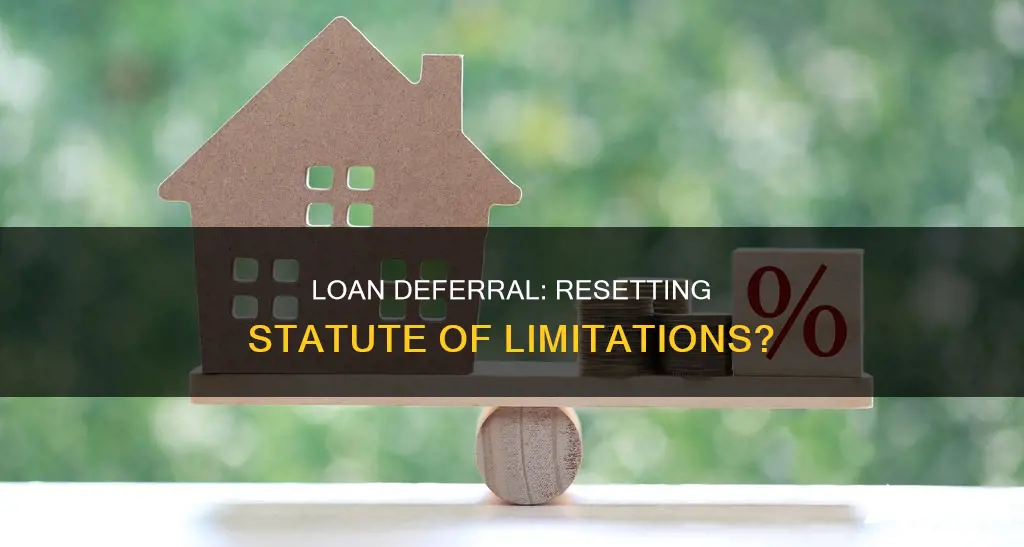
The statute of limitations on a debt is the amount of time a creditor can use the court to force you to pay it. This period varies by state and type of debt, and can be as little as two years or more than ten years. Certain types of debt, such as federal student loans, have no statute of limitations. The clock on the statute of limitations typically starts when an account becomes delinquent, but it can be reset or revived if certain actions are taken, such as making a payment or acknowledging the debt. This is known as re-aging debt and can give creditors greater legal rights to collect.
| Characteristics | Values |
|---|---|
| Does deferring loan reset statute limitations? | It depends on the type of loan and the state in which it was incurred. |
| What is the statute of limitations? | The amount of time a creditor can use the court to force you to pay a debt. |
| What happens after the statute of limitations expires? | Debt collectors can no longer sue for repayment but can still try to collect the debt. |
| How long does negative information remain on a credit report? | Negative information remains on a credit report for up to seven years, and in some cases, up to ten years. |
| Can the statute of limitations be restarted or "revived"? | Yes, by making a payment on the debt or verbally acknowledging the debt as yours. |
| What is re-aging debt? | Re-aging debt refers to a restart of the clock on an old debt's statute of limitations, which can be triggered by the debtor. |
| What is the Fair Debt Collection Practices Act (FDCPA)? | A federal law that governs the actions of debt collectors and gives debtors certain legal rights, such as the right to stop contact. |
What You'll Learn
- Federal student loans have no statute of limitations
- Private student loans are subject to state statutes of limitations
- The statute of limitations on debt varies from state to state
- The statute of limitations clock can be reset by certain actions
- The statute of limitations only applies to your legal responsibility

Federal student loans have no statute of limitations
The statute of limitations on federal student loans was repealed by the Higher Education Technical Amendments of 1991, and these changes were made retroactive by the Higher Education Amendments of 1992 for all loans made on or after April 7, 1986. As a result, federal student loans can remain on a borrower's credit report indefinitely, and can only be removed seven years after they are fully repaid.
It is important to note that deferring payment on a federal student loan may reset the statute of limitations. This depends on the original contract and any subsequent deferment agreements reached with the loan provider. If a creditor or collection agency sues and obtains a judgment against the borrower before the statute of limitations expires, the borrower may be subject to wage garnishments, bank levies, and liens.
In contrast to federal student loans, private student loans are subject to state statutes of limitations, which typically range from three to ten years, depending on the state. After this period, the debt becomes time-barred, and creditors can no longer sue or use legal means to collect the debt. However, it is important to respond to any lawsuits, as a judge may rule in favor of the creditor, making the debt collectible again.
Deferring Institutional Loans: Impact on PSLF Qualification
You may want to see also

Private student loans are subject to state statutes of limitations
The statute of limitations for a written contract no longer applies if the creditor or collection agency sues you and obtains a judgment against you before the statute of limitations expires. In this case, you will be subject to wage garnishments, bank levies, and liens.
It is important to note that the statute of limitations clock for private student loans typically starts on the date of the last account activity. This could be later than anticipated, depending on the type of activity. For example, if you made a payment on an old, delinquent debt, the statute of limitations is reset. Even acknowledging the debt as yours while speaking to a collection agent over the phone may reset the statute of limitations.
If your private student loans are in default and aren't time-barred, you may want to consider a settlement option. In a settlement, the borrower agrees to pay a certain amount, usually less than the total owed, if the creditor agrees not to sue for further money.
Credilla's Loan Eligibility: University Students Only?
You may want to see also

The statute of limitations on debt varies from state to state
The statute of limitations for a written contract no longer applies if the creditor or collection agency sues you, before the statute of limitations expires, and obtains a judgment against you. If that happens, you will be subject to wage garnishments, bank levies, and liens. The average statute of limitations is about six years or less, but some states have much longer statutes of limitations. For example, Massachusetts, Connecticut, Maine, and Vermont have a six-year statute of limitations for credit card debt, while neighboring New Hampshire's is just three years.
The statute of limitations can also be restarted or "revived" if you take certain actions. If you make a payment on an old, delinquent debt, the statute of limitations is reset. If you simply admit that the debt is yours while speaking to a collection agent over the phone, the statute of limitations may be reset. In some states, if you make another payment or even acknowledge a debt in writing, the clock can reset. Federal student loans have no statute of limitations, but programs exist so you can stop paying after a certain period. Private student loans are subject to state statutes of limitations.
It's important to note that even if the statute of limitations has passed, you still owe your unpaid debt, and it will show up on your credit report for up to seven years. Negative information can only remain on your credit report for seven years, and nothing can restart this period, not even a payment on the account. Credit reports also won't track any communication or verbal agreements you made with a creditor or debt collector.
Conforming Loan Limit: Does LTV Impact It?
You may want to see also

The statute of limitations clock can be reset by certain actions
The statute of limitations is a law that protects consumers from being endlessly harassed by creditors about old debts. The countdown on the statute of limitations can be reset or "revived" if certain actions are taken. The specific statute of limitations will depend on the state in which you live, the type of debt, and the state named in the credit agreement. Most states impose a statute of limitations of between three and six years, while some states have much longer statutes of limitations. Federal student loans have no statute of limitations, but programs exist that allow borrowers to stop paying after a certain period. Private student loans are subject to state statutes of limitations, which vary from state to state.
Another way to reset the statute of limitations clock is by disputing the debt. This means you acknowledge that the debt exists but claim that it is not accurate for some reason. This can be done carefully by being mindful of what you say and avoiding agreeing to anything, especially in writing. Simply talking about a debt might not reset the clock, but it is still possible to accidentally reset the clock on an old debt. Therefore, it is important to proceed with caution when communicating with a creditor or debt collector about your debt.
It is also important to note that the statute of limitations only applies to your legal responsibility. You still owe debts that you've accrued, even if they are time-barred. These time-barred debts can remain on your credit report for up to seven to ten years from the date of your last payment, impacting your ability to get loans or credit cards in the future. Negative marks on your credit report due to missed payments will also remain for seven years, and in some cases, up to ten years. While these old negative marks will have less impact on your score over time, they will still be visible.
Consolidating Private Loans: Forfeit Federal Benefits?
You may want to see also

The statute of limitations only applies to your legal responsibility
The statute of limitations is a law that protects consumers from being harassed by creditors about old debts. It is a countdown that typically starts when a borrower misses a payment and their account is marked as delinquent. The specific statute of limitations will depend on the state in which the borrower lives, the state named in the credit agreement, and the type of debt involved. For example, in California, the statute of limitations is two years for oral contracts and four years for written contracts. Most states impose a statute of limitations of between three and six years, while some states have much longer statutes of limitations.
Once the statute of limitations on a debt has expired, it is considered time-barred, and creditors or debt collectors can no longer take legal action, such as filing a lawsuit, to collect it. However, it is important to note that the statute of limitations only applies to the legal responsibility of the borrower. The debt does not vanish, and borrowers still owe the debts they've accrued. Debt collectors can still reach out and seek payment, and the negative marks can remain on the borrower's credit report for up to seven to ten years from the date of the last payment. This can lower the borrower's credit score, making it harder to qualify for new credit or loans and leading to higher interest rates.
To avoid unintentionally reviving a time-barred debt, borrowers should be cautious about acknowledging the debt or making any payments unless they are prepared to pay it off completely. Simply talking about a debt might not reset the clock, but it is important to be careful. Even a simple email acknowledging the debt could restart the timeline. If contacted about an old debt, borrowers can request verification and obtain the date of the last payment to ensure they understand its status.
While the statute of limitations protects borrowers from legal action, it does not prevent all negative consequences of non-payment. The impact of the debt on the borrower's credit score will lessen over time, but the negative mark will remain. Additionally, old debts can still accrue interest and late fees, worsening the borrower's financial situation. Therefore, it is generally in the borrower's best interest to pay off debts within the statute of limitations to avoid these long-term consequences.
Residency Restrictions: Conventional Loans' Impact on Home Buyers
You may want to see also
Frequently asked questions
The statute of limitations on a loan is the amount of time a creditor can use the court to force you to pay a debt. After the statute of limitations has expired on a debt, it is no longer legally enforceable. The statute of limitations depends on the type of loan and the state in which you live. Federal student loans have no statute of limitations, while private student loans are subject to state statutes of limitations.
The statute of limitations period usually starts ticking on the date of the last activity on the account. The specific statute of limitations will depend on the state in which you live and the type of debt involved. Most states impose a statute of limitations of between three and six years, but some states allow debt collectors up to 10 years or longer to file a lawsuit.
Re-aging debt refers to a restart of the clock on an old debt's statute of limitations. Re-aging can occur when a borrower acknowledges a debt or makes a payment on it, giving the creditor or collector more time to take legal action.
To avoid resetting the statute of limitations, do not acknowledge the debt or make any payments unless you plan to pay it off in full. If contacted about an old debt, request verification and obtain the date of the last payment. Be mindful of what you say and avoid agreeing to anything, especially in writing.







